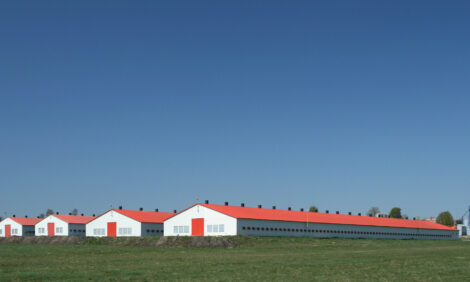



International Egg and Poultry Review
US - By the USDA's Agricultural Marketing Service - This is a weekly report looking at international developments concerning the poultry industry, this week covering the Fifth Ministerial Conference, Dutch Avian Flu Costs.
Fifth Ministerial Conference Ends Without Agreement
Mexican Trade Minister Luis Ernesto Derbez formally closed the Fifth
Ministerial Conference on September 14, 2003. The meeting had
collapsed in mid-afternoon over ongoing deep divisions among
Members and closed without agreement on a Ministerial Text. According
to the one page Ministerial Statement, a meeting of the WTO General
Council at Senior Officials level will be convened no later than December
15, 2003, “to take the action necessary at that stage to enable us to
move towards a successful and timely conclusion of the negotiations.
We shall continue to exercise close personal supervision of his
process.”
WTO talks to free up world trade collapsed when delegates from Africa,
the Caribbean and Asia walked out of the talks. Those countries rejected
new rules on investment and rich and poor states clashed on farm
reforms. According to the WTO, as of April 4, 2003 there were 146
member countries. Cambodia and Nepal membership was sealed on
September 11 and they are set to become the WTO's 147th and 148th
members, 30 days after they ratify their agreements. The current 146
member countries of the WTO were not able to bridge large differences
over how quickly rich countries should lower payouts for farm subsidies
and developing countries were unwilling to negotiate new rules for
foreign investment and other issues.
Agriculture had been expected to be the main issue. In July, 2003, 25
members of the WTO met in Montreal to bridge gaps over agriculture.
However, in Cancun ministers spent little time on agriculture and
instead discussed the Singapore issues – cross-border investment,
competition policies, trade facilitation and transparency in government
contracts. Developing countries wanted an agreement on agricultural
issues before addressing the Singapore issues.
Many countries are now expected to actively pursue bilateral trade talks
with individual countries. The United States wants a free-trade agreement
stretching from Canada to Chile, however, the failure of talks in Cancun
could severely complicate negotiations at the November ministerial
negotiations for the Free Trade Area of the Americas (FTAA). Brazil led
a group of middle income countries such as Mexico, Korea, China and
India, that stood up to the United States and the European Commission.
U.S. Senator Chuck Grassley warned: “The US evaluates potential
partners for free trade agreements on an ongoing basis. I’ll take note
of those nations that played a constructive role in Cancun and those
that didn’t.”
The WTO was formed in 1995 as an organization to negotiate and
adjudicate trade agreements. A World Bank report “Reciprocity in Free
Trade Agreements,” listed 64 Free Trade Agreements from January 1,
1983 though December 1, 1999.
Sources: Bridges Weekly Trade News Digest, World Trade
Organization, USDA/FAS, various news wires
Dutch Avian Flu Costs
The avian influenza epidemic is estimated to be at least E750 million
by the Agricultural Economics Institute (LEI). Preliminary figures indicate
the loss of income from the sales of poultry and eggs was E500m. The
culling of about 30 million hens and broilers cost E270m, of which the
EU will have paid half. Ancillary trades have incurred losses and some
export companies may not survive. The Netherlands has been the
leading exporter of eggs (over 7000 million a year) and a large part of
this trade may be lost. This could double the sector’s losses.
| Dutch Poultry Industry in 2002, in metric tons | ||
| Netherlands | European Union | |
| Egg Production | 547,000 | 5,173,000 |
| Chicken meat | 635,000 | 6,431,000 |
| Turkey meat | 43,000 | 1,827,000 |
| Duck meat | 15,000 | 398,000 |
| Source: AGRI.D.2 | ||
| Production Figures for Dutch Poultry Industry | ||
| No. of Establishments | No. of birds/eggs | |
| Egg Sector | ||
| Parent stock farms | 55 | 600,000 |
| *Hatcheries | 5 | 88,000,000 |
| Rearing pullets | 400 | 28,000,000 |
| Laying hens | 2,000 | 31,000,000 |
| **Egg packing centers | 235 | 10 billion |
| Meat Sector | ||
| Parent stock | 530 | 6,000,000 |
| Hatcheries | 28 | 580,000,000 |
| ***Broilers | 1,200 | 50,000,000 |
| Slaughterhouses | 46 | NA |
| * Number of eggs = expressed in hatched eggs ** Number of eggs produced (<2.5 billion table eggs) *** Number of broilers present (one cycle) The national poulty stock amounts to some 100 million birds at any given moment Source: LNV |
||
Source: International Egg Commission, European Commission
French Farmers Compensated for Heat Loss
French pig, poultry and rabbit farmers could receive some
reimbursement for losses during the recent heat wave. Around 5 million
chickens and turkeys died in August due to the heat. The impact on
chicken production will probably be less than a 5,000 MT drop in the
985,000 MT production estimate. Most poultry production is located in
the western part of France, where the heat and drought were not so
severe. Production in affected areas should resume in a short time.
Production costs will probably increase by a few cents per kilo, plus
feed costs are likely higher due to the short grain crop in France. While
some farmers may have had insurance to cover losses due to drought,
some insurance policies did not cover losses due to heat stoke.
Source: USDA/FAS, news wires
To view the full report, including tables please click here
Source: USDA's Agricultural Marketing Service - 23rd September 2003.








